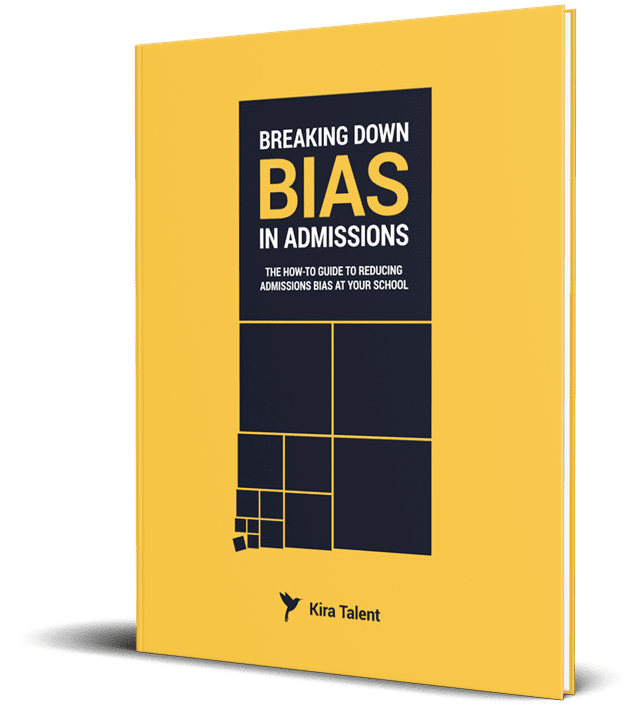Plagiarism. Falsified documents. Black market consultants. It sounds like the plot of a Hollywood movie, but it's not -- it's just a day in the life of an admissions team at universities and colleges around the world.
Admissions fraud is a problem facing virtually every admissions team at a competitive school, whether they realize it or not. At Kira, we've been working hard to bring this issue to light. In fact, our eBook, titled 'Admissions Fraud: The Truth Behind the Application', has been read by hundreds of admissions teams in North America and was even featured in USA Today.
But we want to do more than just talk about the problem. We want to help you prevent it at your school, since according to our informal survey, 71 percent of schools do not have a process in place to prevent and detect fraudulent applications.
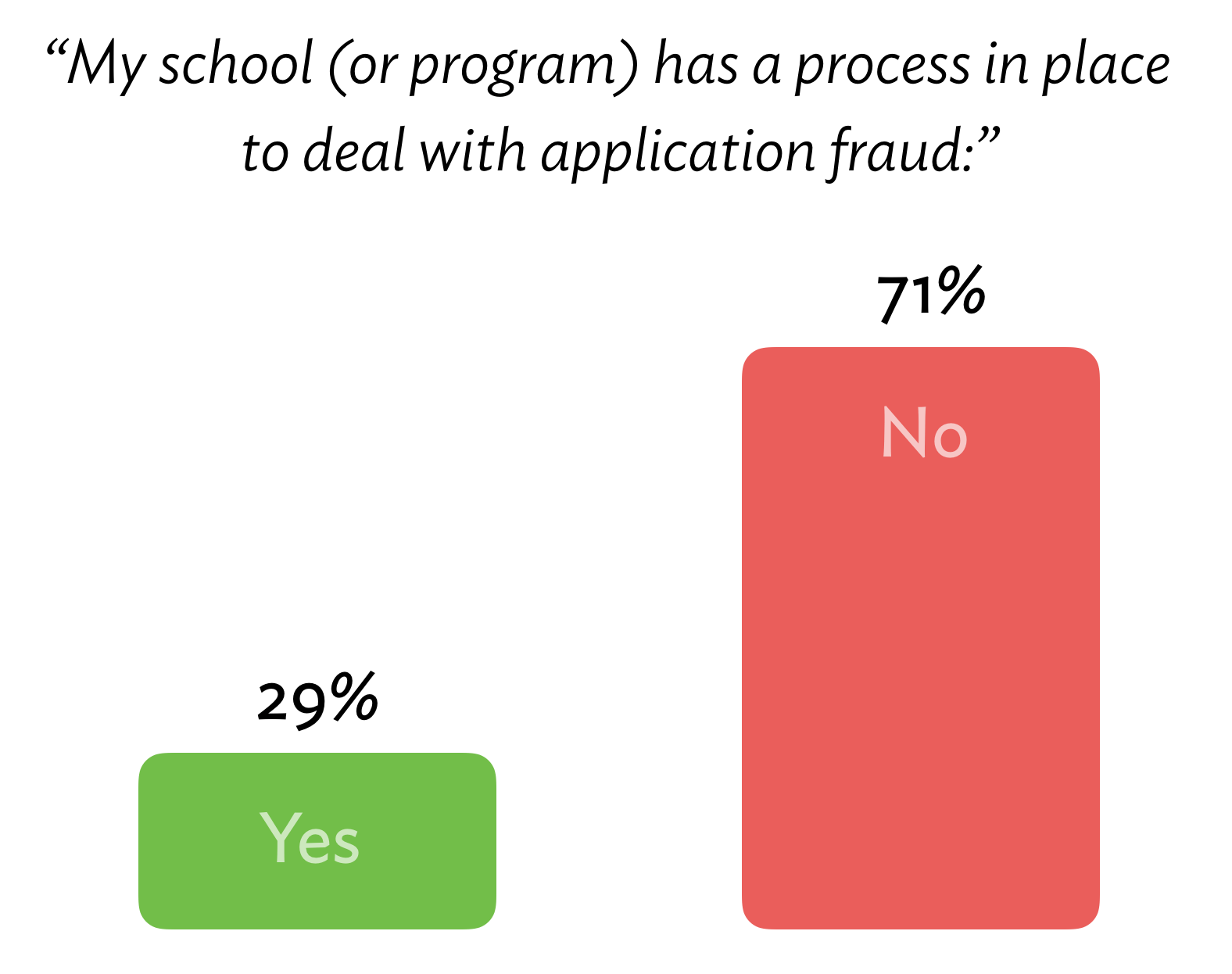
To do that we teamed up with Carrie Marcinkevage from Smeal College of Business — MBA Managing Director by day, and unofficial admissions fraud superhero by night. Her work has been featured in The New York Times and USA Today, and she was also kind enough to join us as part of our 'Ask the Expert' series to share her research and some strategies schools can use to prevent application fraud at their school.
If your school or program requires applicants to submit any written content, including resumes, written essays, and personal statements as part of their admissions application, then this post is for you. While the content here is weighted slightly more towards business school admissions, the tips and tricks will work with any program.
So what are you waiting for? Start fighting back against application fraud at your school.
Table of contents
- Why Do Students Commit Fraud?
- Case Study: Smeal College of Business
- All About Admissions Consultants
- Spotlight: Application Fraud in China
- Preventing Application Fraud At Your School
- Watch the Webinar Recording
Why Do Students Commit Fraud?
Most admissions teams know that application fraud is a problem that they want to address, but few stop to ask "why" students actually commit fraud.
Luckily, this is an area that Carrie spent considerable time researching. She believes the reasons can be broken down into four broad categories.
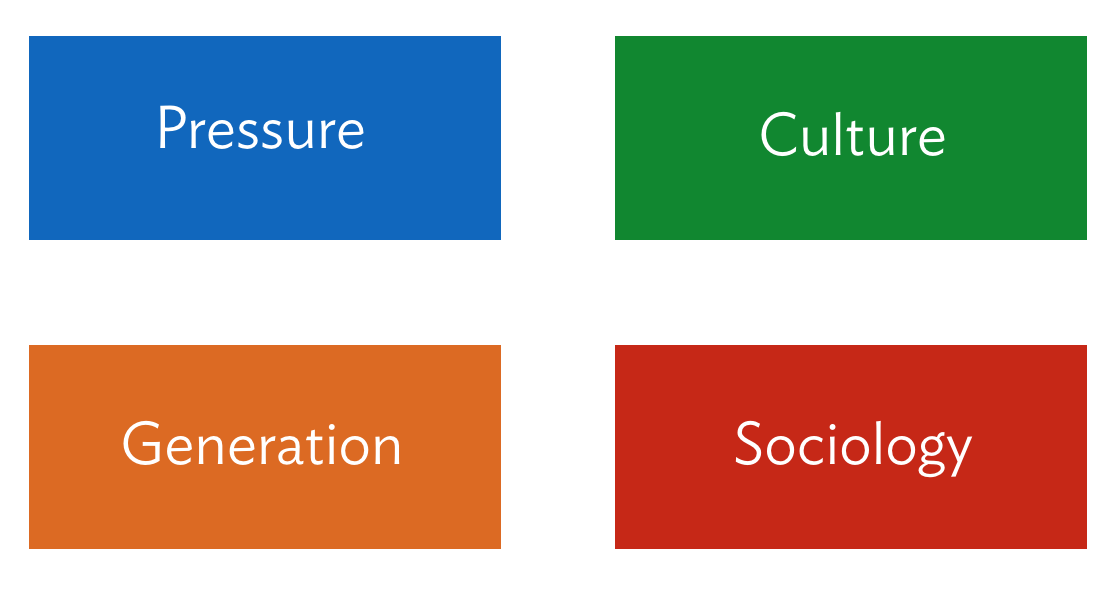
Pressure
This won't come as a surprise to anyone, but we live in a world full of pressure.
Whether it's pressure from friends and family to meet their expectations or time pressure to get stuff done, you can't escape it. And filling out admissions applications is a time-consuming affair, with each application requiring multiple written essays, personal statements, interviews, transcript submissions.
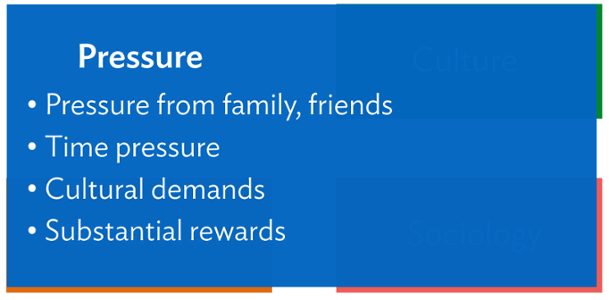
Compounding this is the fact that the average applicant applies to three or more graduate business programs, and you can see where the desire to take a shortcut comes into play.
Finally, the potential rewards for earning a spot at a top school can be considerable, with median first year compensation packages reaching as high as $150,000 US for Harvard MBA Graduates, it's no wonder students are doing whatever it takes to get into the program of their dreams. Top MBA programs can have acceptance rates as low as 6%, so doing what it takes to stand out is a must.
Culture
As the number of international applications continues to soar for Western schools, differences in cultural values and attitudes towards application fraud, as well as deep-rooted differences in teaching methods, become increasingly apparent. This is a tough issue to address, and for many, somewhat difficult to even wrap your mind around.
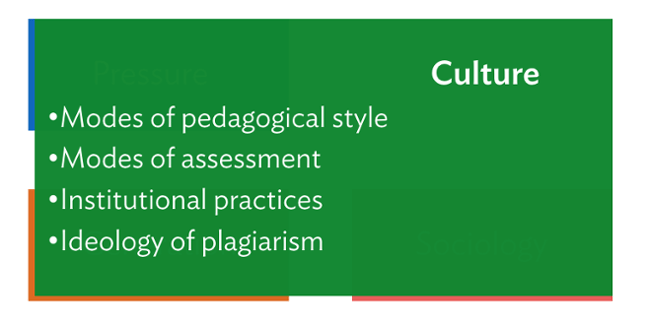
Imagine you grew up in a country where ideas were not considered property, and the whole idea of plagiarism seemed counterintuitive to progress? Where teaching is focused on memorization and repetition and the concept of fraud is literally foreign to you? It's hard to imagine, but this is the case for a lot of international applicants.
"For cultures whose educational system focuses highly on testing and little on writing or constructive argument, essays themselves are foreign; plagiarism is often unheard of," according to Carrie.
Generation
Technology has made accessing the world's information easier than ever, and this freedom of information has changed how people view the ownership of information. Call it a Gen Y thing, or as Carrie likes to joke, a symptom of the "CTRL-C + CTRL-V Generation", but it's undeniable that this generation of students is growing up in a world where information is more readily available than ever.
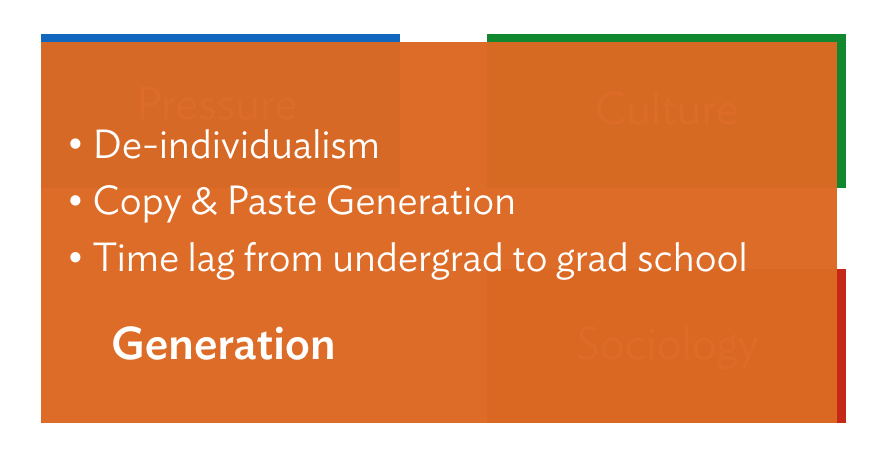
Carrie is quick to point out the effect social media has had on this new generation of connected students, where privacy isn't a concern and information is open and readily available. "It's more about being connected than being unique," said Carrie. "It's much more about the conversation than it is about who owns the idea."
There's also a growing time lag between students finishing their undergraduate studies and pursuing gradute level studies, especially in management education where work experience is factored into your admissions application. "I remember when I went back to grad school, I was asked to write an essay," Carrie joked. "No. I'm sorry, I only write in PowerPoint now." This return to essay writing is often shocking to graduate students and can lead them to seek assistance with the task.
This is where lines can get crossed.
Sociology
There are two theories at play here. The first, is that younger students, particularly at an undergraduate level, may lack sufficient moral development. They're motiviated by self-interest and personal gain more than the what's best for society at large.
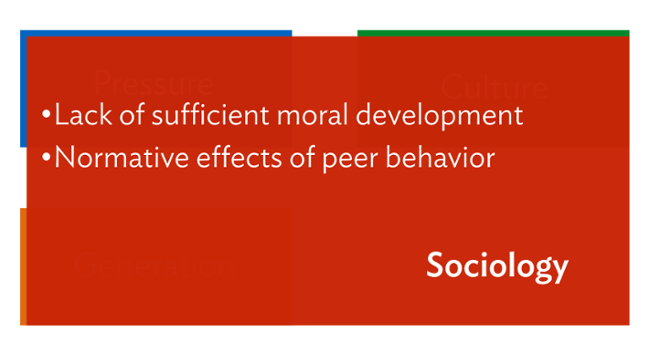
But what about graduate students? Presumably, their moral development would be developed enough to know better. Carrie cites extensive research that shows the behavior of individuals is often regulated by the behavior of their peers. If a student perceives the rest of the applicant pool to be cheating, they themselves may feel inclined to do so as well. This is especially true for international students in countries like China and India, where application fraud is commonplace.
Case Study: Smeal College of Business
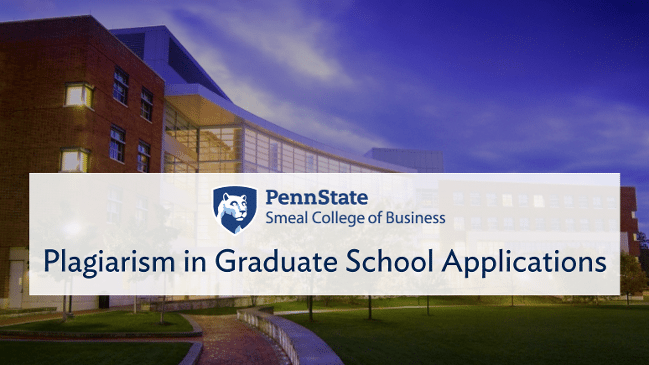
Carrie shared the story of the work the admissions team at Penn State's Smeal College of Business did to fight back against plagiarism in their admissions applications.
Ironically, the issue of plagiarism first became apparent while Carrie was reading a student's admissions essay on the topic of "principled leadership". She noticed a familiar passage -- something that she had read in a previous application and decided to Google the sentence in question.
Not surprisingly, she found a matching article on the subject where this applicant had clearly "borrowed" substantial amounts of content.
"So we stopped the presses and realized we had a problem, and we decided to go back and read all of the applications that were still in progress," she said.
What they found was staggering.
Out of the 360 pending applications they had, 29 of them contained passages from this same article.
The actions Carrie and her team took varied, ranging from asking several students to rewrite their essays for borderline plagiarism, to canceled interviews, to rescinding a student's offer of acceptance.
"It wasn't easy to do, but we thought it was very important for us to penalize this inappropriate behavior," Carrie said. "We have an honor code at Smeal College, and the honor code is very specific about how we think about ethics and what's important to us, and we knew we couldn't have those in the program who had committed plagiarism."
Reactions from the students caught for plagiarism varied dramatically, from a simple "thank you", to outright denial, to accusations of slander.
But that wasn't their biggest problem moving forward. "We were starting to look at the whole essay reading process pretty negatively," said Carrie. "We were reading them to catch plagiarism, rather than to find great candidates. We weren't remembering any of their really wonderful personal stories."
How Smeal Fought Back Against Application Fraud
Carrie knew that reading admissions essays through the lens of plagiarism was hampering her team's ability to assess the fit and potential of each applicant, and decided to do something about it.
They considered many approaches, but it came down to two primary choices: a proactive versus a reactive approach to their new authenticity review process.
Proactive approach: Design a process up front where all admissions applications would be reviewed for plagiarism.
Reactive approach: Design a process where only applications suspected of plagiarism would be reviewed.
Ultimately Carrie decided on two things: a proactive approach, and the use of Turnitin, a plagiarism detection service used by over 15,000 academic institutions around the world. By scanning all incoming applications for plagiarism, Carrie and her team were able to go back finding the best students for their program without having to second guess everything they read.
Preventing Fraud Through Education
It wasn't enough to just detect fraudulent application components as they came in, Carrie also wanted to prevent it from happening in the first place.
"Much of the discussion among the students and the admissions team reviewing the initial cases centered around questions of clarity in understanding US academic standards and what constitutes plagiarism," said Carrie.
"We also tried to do applicant education on ethics in the admissions process, and we wanted to make sure we were absolutely clear about it." That meant talking about the issue on social media and online message boards, and working to fill an "educational gap" by offering applicants webcasts on ethics and by adding instructions on their website.
The Results Arrived: Carrie's Findings:
So did the steps Carrie and her team took to curb plagiarism actually help?
For the most part, yes. While the number of plagiarism cases did fall dramatically the following year, they did rebound slightly the year after that. "Since each year’s application pool is an almost entirely new audience, subsequent applicants [were] likely unaware of the 2010 plagiarism incident and warnings," said Carrie.
Her summarized findings are below:
- On average, 7 percent of applications contained elements of plagiarism
- If plagiarism was detected in an essay, there were typically multiple instances.
- Applicants with low English language test scores were more likely to plagiarize
- Surprisingly, students with high GMAT scores plagiarized more frequently
- Plagiarism was more common from applicants in India and China
As an added bonus, the number of academic integrity plagiarism violations dropped in the classroom each year since instituting a more rigorous plagiarism detection process during the admissions process. Carrie noted that "the hypothesis that not admitting plagiarists leads to higher academic integrity could have tremendous academic implications and could lead to a compelling case for admissions plagiarism detection."
All About Admissions Consultants
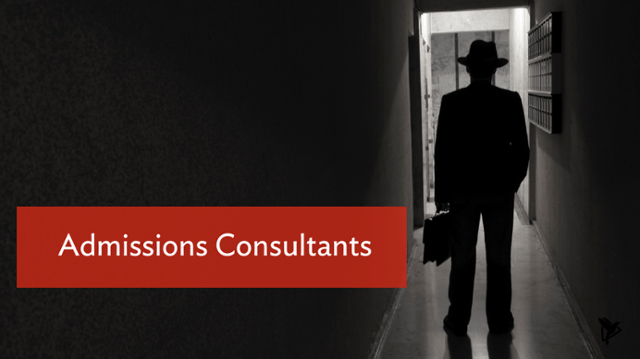
As Carrie demonstrated, plagiarism is an issue that can be addressed through a combination of applicant education and an effective top of the funnel screening process.
But what about admissions consultants? Dealing with them requires a much different strategy since their work is often original and therefore difficult for programs like Turnitin to detect.
What Is an Admissions Consultant?
First, let's get this out of the way. They're not the shadowy figure lurking in the hallway like I've illustrated above. In fact, the reality is quite different. Their websites are bright, colorful, and approachable. Some even have built-in plagiarism checkers.
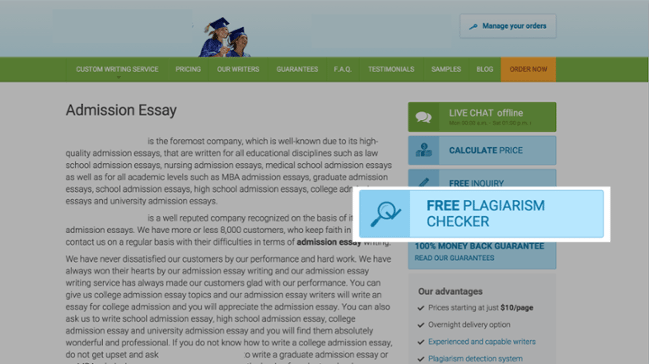
Not all consultants are bad though. There are many legitimate services out there that pride themselves on helping out students in a fair and honest manner. But there are also just as many out there who will take things several steps further and write a student's entire admissions application for them.
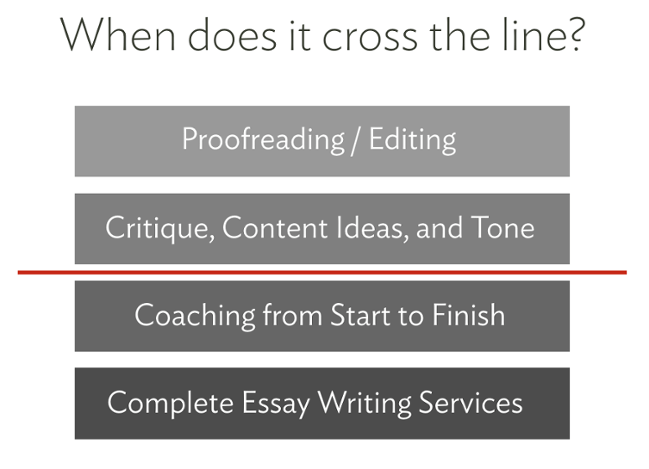
So when does getting help with your application cross the line? Well, that's open for debate.
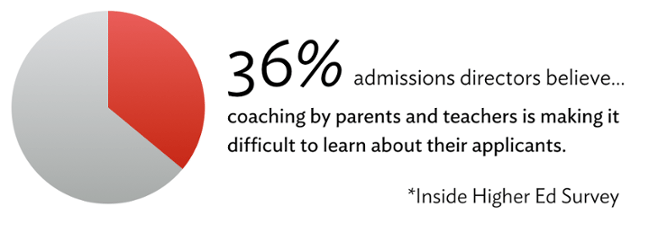
Based on our research, most schools are OK with students having their essays proofread and edited by others, including family, friends, and even consultants. Many commented that it would be silly not to do so. Data from an Insider Higher Ed study of admissions directors confirms this, with only about a third of respondents agreeing that coaching by parents and teachers made it difficult to learn about applicants.
Where the line often does get crossed is when applicants hire consultants to coach them through their application from start to finish. These consultants will often ask applicants where they're applying, and help them develop a custom strategy to apply for the school.
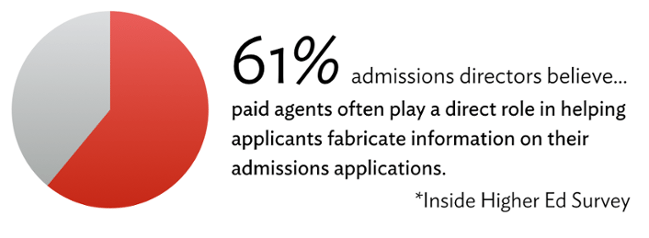
It sounds innocent enough, but these admissions professionals know what the school is looking for in their applicants, and they'll often help students craft the perfect application to improve their odds of acceptance. Not surprisingly, 61 percent of admissions directors agreed that this was a problem in the same study done by Inside Higher Ed.
Complete Essay Writing Services
One area that is universally regarded as "crossing the line" is complete essay writing services run by "black market admissions consultants". No matter how you slice it, having a third party write your admissions essay or recommendation letters is fraud.
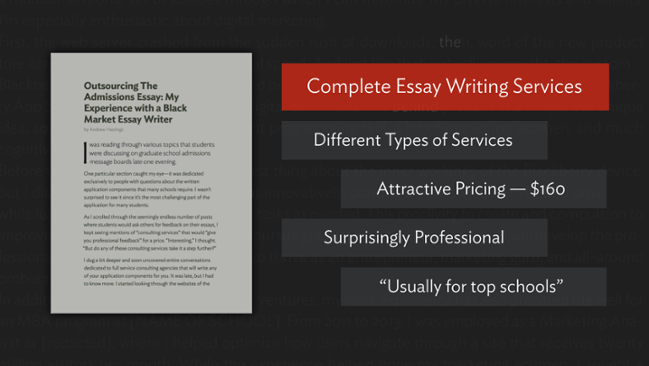
This is an area I actually have first hand experience with, having plagiarized my MBA admissions essay in the past. Admissions consultants that will write your entire admissions essay for you are everywhere. A quick Google search reveals dozens, and any student who visits an online university message board will turn up even more. Prices vary, but you can expect to pay anywhere from $150 up to $300 for a typical "personal statement" required on most admissions applications.
I sat down with one of these admissions consultants and had the chance to ask him a few questions. Our consultant, who we'll name Michael, himself a graduate of an Ivy League school, started his business several years ago. “One of us worked in the admissions office for a while, another did private consulting, and a couple of us were just writers,” he said. “We realized it was a pretty lucrative business and there’s a niche for us to fill. There’s definitely demand.”
If you want to read more about my experience hiring one of these consultants, check out this post.
Spotlight: Application Fraud in China
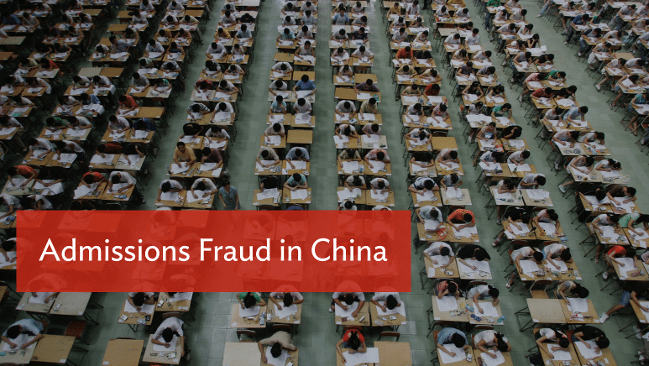
If your school is recruiting international students from China, it's essential to have a process in place to effectively screen applications for fraudulent activity.
An article published in The New York Times cited research from Zinch China, a consulting company that advises American colleges and universities about China, showed some staggeringly high numbers of fraudulent activity coming from applicants in China:
- 90 percent of Chinese applicants admitted to submitting false recommendations
- 70 percent admitted to having other people write their personal essays
- 50 percent had forged high school transcripts
- 10 percent had falsified academic awards and other achievements
Why Application Fraud in China is a BIG Deal
So we know why a large percentage of students in China hire consultants to work on their admissions applications, but we haven't talked about why it's a BIG deal and why schools need to have a process in place to ensure they're only admitting honest, hard-working students.
Consider the following:
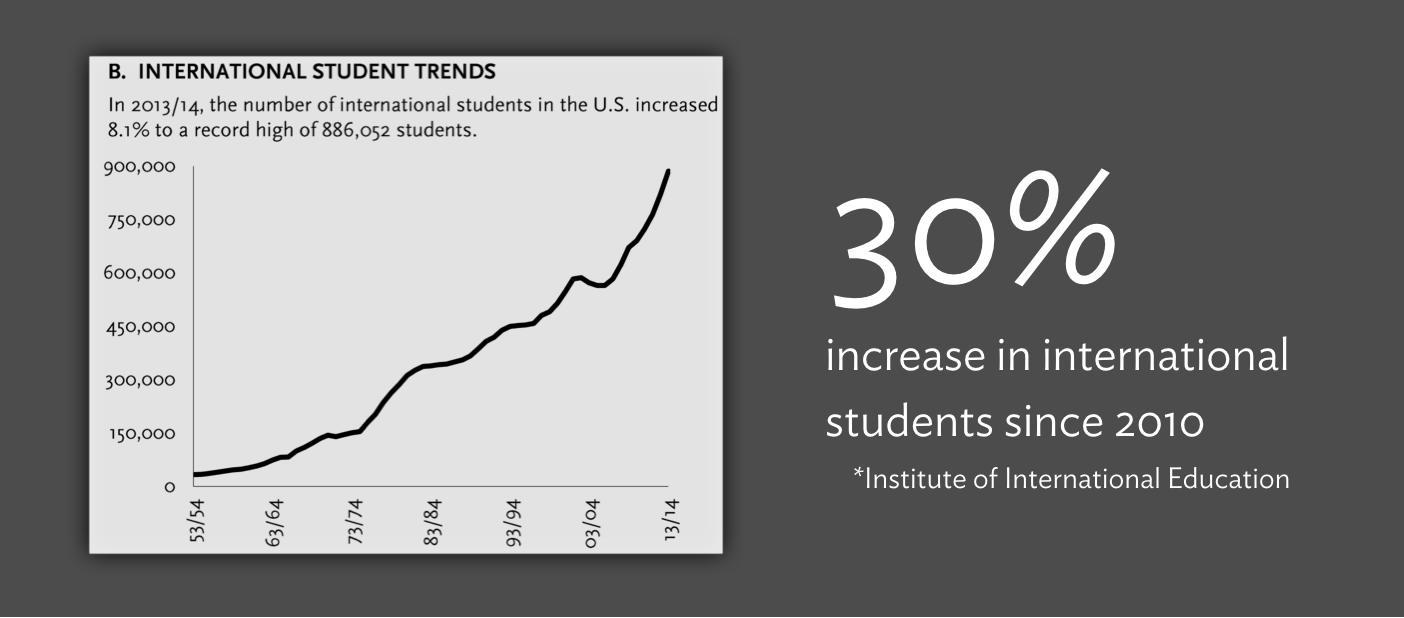
According to the Institute of International Education, the number of international students in the United States is soaring -- up 30 percent since 2010.
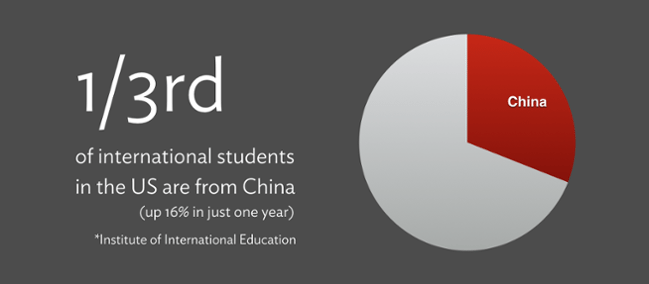
Leading this growth is China, making up a full third of all the international students in the US.That's up 16 percent in just one year.
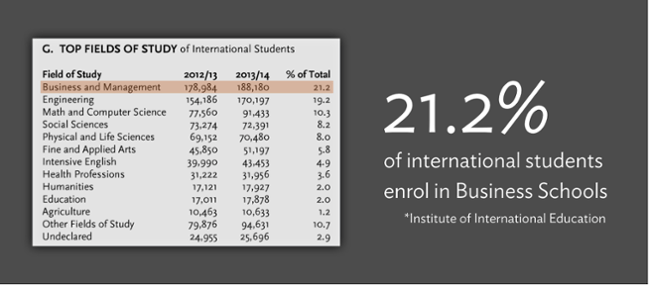
Their top fields of study are Business and Management (21.2 percent), Engineering (19.2 percent), and Math and Computer Sciences (10.3 percent). Notice a trend here? They're programs that rely heavily on quantitative work, an area in which communication skills are less important.
Why Students in China Commit Fraud
Applying to post secondary institutions in China is a completely different experience than it is in the US.
The application process in China may contain fewer components, but it is much more stressful since most schools only take the student’s Gaokao score into consideration. The students rank the schools they’d like to attend in order of preference, and if they score high enough on their test relative to their peers in their region, the school accepts them.
In contrast, the application process in the US is a notoriously complicated process. Requirements vary by school, by program, and by level of education for both domestic and international students. There’s a seemingly endless list of documents to submit: letters of recommendation, SAT scores, personal essays and statements (anywhere from one to four per application), and high school transcripts including GPA.
If the student is from a non-English speaking country, they must also take the TOEFL test to assess their English language skills. If they are applying to graduate schools, they are required to write the GMAT or one of several other standardized tests rather than the SAT.
Needless to say, each application is a lot of work. Since students from China are unfamiliar with this involved process, it has spawned an entire industry of consultants and agencies dedicated to helping them gain acceptance to the U.S. school of their choice. Some of these agencies also help these students cheat on their applications.
Add to this the fact that most schools only provide their admissions information in English and it’s easy to see why Chinese students would want help from an outside source. Students often turn to admissions agencies and consultants to help them navigate the complicated process. These agencies charge students to not only guide them through the process but also to help them with their writing skills, study for standardized tests, and explain what schools are looking for in essays and recommendation letters.
However, Chinese parents and students often come to these agencies demanding that they get accepted to U.S. colleges by ‘any means necessary’. Therefore, these admissions agencies have become experts at writing applications, essays, and recommendation letters on behalf of the students that will get them into almost any school they’d like. They have become so good at manipulating the system that some are able to offer guarantees of admission for the right price. Seriously.
This has become such a widespread issue in China that students now feel at a disadvantage if they don’t cheat.
The cultural attitude in China is to do everything possible to support one’s family. Parents work very hard to set their children on a path with the best possible chance at a prosperous life so that they can, in turn, support aging family members later. Students don’t necessarily see this as cheating, but as providing for their family by any means necessary.
Unfortunately, the only real repercussion if caught cheating is rejection from the school. Schools rarely, if ever take legal action even though what these students are doing is illegal. According to Bloomberg, the costs of legal action are high and therefore not worth pursuing so students are just rejected and able to apply to a different school. For the students, the benefits greatly outweigh the risks of rejection on these grounds.
Why Your School Needs to Continue Recruiting From China
Let's take a deep breath and acknowledge that this information doesn't paint a very nice picture of applicants from China. Yes, a huge percentage of them hire admissions consultants to craft the perfect admissions application, and yes, there are more and more of them looking to study abroad, but don't panic -- this is actually good news.
Honest International Students Perform Just As Well As Their Domestic Counterparts
This needs to be said. Honest, hard-working students from other countries, including China, perform just as well as their domestic counterparts once admitted. While their communication skills may not be as strong, they generally perform strongly in math-intensive programs like Business, Engineering, and Mathematics. In fact, some of them are strong enough candidates to be admitted into the most selective of programs, including Harvard Business School, which admitted 19 students from China in its class of 2016.
International Students Bring A Unique Perspective To the Classroom
Great admissions teams work hard to build a strong and diverse cohort each year, and a major component of that is admitting students from other countries. They bring a unique perspective to the classroom and give domestic students a taste of what to expect in the working world, where they will undoubtedly work with people all over the world.
International Students Represent A Huge Growth Opportunity For Your School
The goal of any school should be to provide a great education and great employment opportunities for it's students. But if we're honest, we also know that admissions teams, especially program directors, are feeling the pressure to improve their application volume, selectivity, and yield.
For those of you that can relate, you'll be happy to know that international students represent a huge growth opportunity for your school. You're gaining access to a virtually endless pool of highly intelligent, highly motivated students with the financial resources to pay their tuition fees without assistance.
In China, for example, 62 percent of Chinese applicants to American undergraduate programs can afford to pay at least $40,000 annually for their schooling. Admitting more students like these means schools are able to maintain their yield rates, class sizes, and budgetary goals.
Honest, Hard-Working Chinese Students Are Fed Up Too
This is something you don't hear a lot of people talking about, but it's probably the most important reason to prevent application fraud at your school: it puts honest, hard-working students at a disadvantage. And they're fed up too.
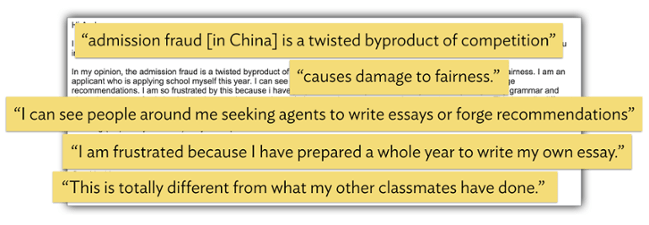
Just look at this email we received from a Chinese student looking to apply to a top US school earlier this year.
"Admissions fraud [in China] is a twisted byproduct of competition."
"It causes damage to fairness."
"I can see people around me seeking agents to write essays or forge recommendations."
"I am frustrated because I have prepared a whole year to write my own essay."
"This is totally different from what my other classmates have done."
Higher education's inability to address this problem directly has put international students in a position where you don't cheat to get ahead, you cheat on your application just to stay competitive with everybody else. That isn't right, and frankly, if your school doesn't have a process in place to fight fraud, you're inadvertently perpetuating the problem.
Preventing Application Fraud At Your School
Preventing admissions application fraud at your school may seem like a daunting task, but it doesn't have to be. With the right process in place and a few helpful tools, you can help prevent and detect fraudulent applications.
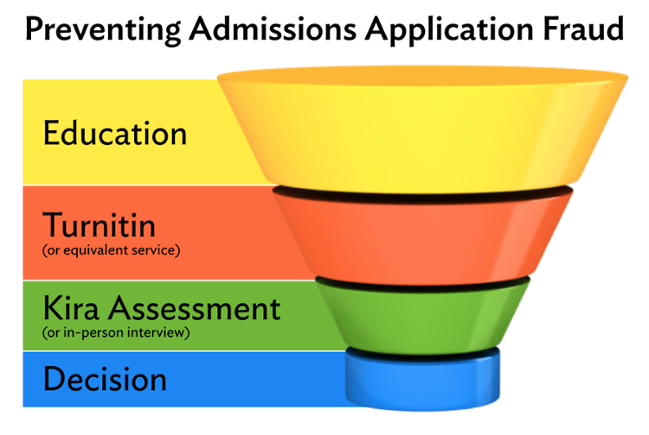
Educate Your Applicants About Plagiarism and Fraud
One of the most important things your school can do to prevent plagiarism and fraud is to educate your applicants and prevent it from happening in the first place.
It is imperative to openly communicate your school's stance on plagiarism, the use of consultants, and other types of fraud at the start of the application process. Don't assume your applicants know it already, and don't bury the information on your website.
Here are a few tips:
1. Set up an 'Admissions Integrity and Plagiarism' page on your school website where you specifically discuss:
- Why your school or program is taking a stand against fraud and the process that all applications will go through
- What constitutes plagiarism on admissions applications
- Your official stance on the use of admissions consultants
- A link to your school's honor code (you do have one, right?)
- Contact information for students who have additional questions.
2. Provide a link to your new admissions integrity page on the first page of your online application.
- Consider making it a mandatory step of the application process and require students to either check off a "tick box" or initial a small text box stating that they have read and understand the terms.
3. Host a webinar where you invite applicants to learn more about what constitutes plagiarism and fraud. Give them a chance to ask questions.
- Make sure to record the webinar, since it's great material to share with applicants in the future.
4. If your school or program has a blog for prospective students, write and share a blog post on this subject with your readers.
Turnitin -- by iThenticate
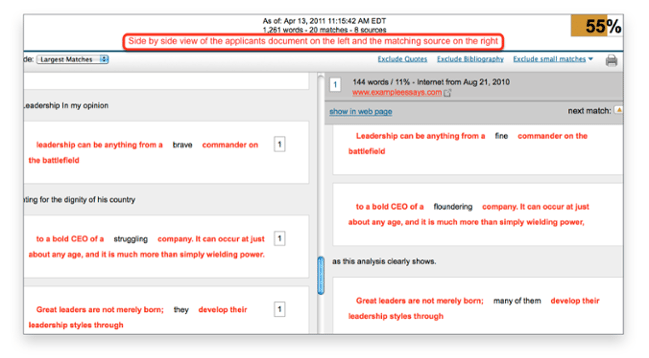
After educating your applicants, the next step is to move all of your applications through a plagiarism detection service like Turnitin. This will scan all the resumes, personal statements, and written essays that your applicants submit and look for similarities with other written work on the web.
Here are some tips:
- Scan all incoming essays with Turnitin, not just ones that you suspect are fraudulent.
- This will reassure your team that the applications they're reading are authentic, so they can go back to finding the best students, instead of looking at everything suspiciously.
- Build out a document containing a few samples of different types plagiarism and the consequence of each as you find them.
- This will allow your team to make quick, consistent decisions on how to proceed when issues are discovered.
- Set up an escalation process and decision tree so that your team has a consistent process to follow when plagiarism is detected.
- Decide whether or not you will notify applicants when it's detected.
Kira Assessments or In-Person Interviews
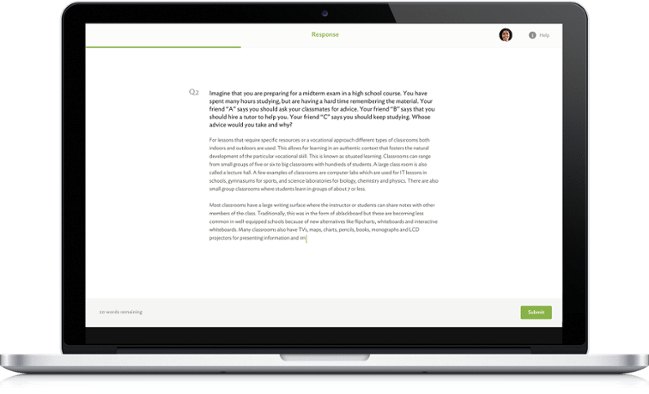
Your goal as an admissions team is to gain as much insight into an applicant as possible, but admissions consultants can make that job nearly impossible. While Turnitin is a great tool for detecting plagiarism, it doesn't do much to detect applicants who have used admissions consultants to help them with their written essays.
If you want to get an authentic view of your applicant, you either need to conduct in-person interviews or use the Kira platform to get a real glimpse of their true potential.
Here's a quick overview of Kira:
Kira allows you to add an interactive video and written component into your admissions application.
- During the application process, your applicants are asked to complete a Kira assessment designed by your admissions team.
- A typical Kira assessment is comprised of 3-5 video and written questions, in random order.
- Applicants only have one chance to answer each question. No retries allowed.
- Your team can create a pool of questions. We recommend 40 or more. Your applicants receive a random selection of questions from this pool. No two applicants have the same questions.
- Timed Video questions: Applicants use their webcams or smartphones to respond to video questions that your admissions team records ahead of time.
- Timed Written questions: Applicants type their responses to text questions that your admissions team selects ahead of time.
Kira gives your admissions team an authentic look at the communication skills your applicants possess in a fraction of the time when compared to in-person interviews. By reviewing short video responses from your candidates, you can assess their verbal communication skills and see how they think and respond on their feet.
In the context of fraud prevention, our written responses feature is a great way to collect real-time written samples from your applicants. These timed written responses can then be compared with the written materials your applicants submitted earlier in the application process. If you notice a large descrepancy between the two of them, particularly in terms of writing ability, you may have found an applicant who used a consultant for their admissions essay.
It's Time To Get Started
You've read the post, you've watched the webinar. You are now the admissions fraud expert at your school.
What's next? It's time to get started.
Share this post with your colleagues, call a meeting, and start fighting back against application fraud at your school today.
Kira wants to know: What does your school do to prevent application fraud during the admissions process? Leave it in the comments below.
If you missed the live webinar with Carrie, you can watch the recording below:



